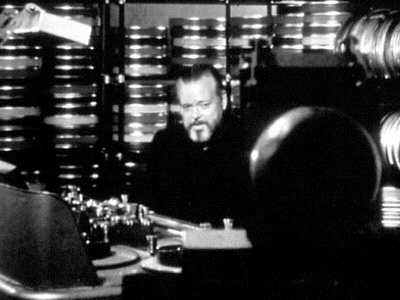REVIEW: F for Fake
This is perhaps the smartest movie you will never see.
F for Fake, the last feature film completed by Orson Welles before his death, intends to expose the world of fakery and trickery inherent in our own lives through three main examples (one of them fake itself): the story of Elmyr de Hoy, perhaps the 20th Century’s greatest art forger, Clifford Irving, the man who wrote a biography of Elmyr and then supposedly ghost-wrote an autobiography of Howard Hughes, and Oja Kodar, a young woman who seduced Pablo Picasso into painting 22 full works of art for her, and then selling them herself. Throughout the film, short pieces of Welles’ own life and career as well as shorter examples of fakery in everyday life are interspersed. The result is not a documentary, or even a total expose. What F for Fake is defies general terms, becoming an “essay” film.
If any of this sounds boring or uninteresting to you, it probably is. I sat through F for Fake all the way through, and dozed off more times than I can count. As a result, the film felt disjointed and confusing. The beginning especially is enough to leave any casual cinema-goer in its wake. It reminded me of the earlier, more recognizable, work of the director, Citizen Kane. It was long and uninteresting, like a novel with a great concept that fails to hook a reader. The thing to remember is that Welles is an auteur, and is unconcerned with the general comfort of the audience, as long as he can get his point across.
You see, I judge cinema by two criteria: 1) Is it entertaining? 2) Does it inform?
A lot of really good films are able to do both at the same time, but F for Fake only informs. And, as I said earlier, it’s like reading a really thought-out and subtle essay. It requires a lot, and I mean a lot of thought. So if you were to ever see this movie, don’t go into it expecting to turn your brain off and be entertained. Of course, this film wasn’t even made for the masses, who want to be entertained. Unless you’re a film aficionado, or someone with a pompous sense of intelligence, F for Fake won’t even appear as the tiniest blip on your radar. Instead, I’d recommend watching V for Vendetta again (which is a really great film, mind you).
Welles is probably the most engaging person in this film, as it is his thoughts that we are riding like a surfer on the wave. While the film did bounce right off me, it was nice to see a film with a documentary style that defied expectations and didn’t have to present both sides of an argument. The film is him, speaking directly onto the celluloid, and as the stories tell, Welles took some commercial jobs and acting roles he loathed to create films like this. (Does anyone remember him in Transformers: The Movie? Didn’t think so.) But seeing as this is Welles’ last film, I couldn’t help feel that a part of F for Fake was him trying to explain, summarize, or even apologize for his own career. He points to the infamous “War of the Worlds” broadcast as an example of how persuasive a good liar can be. While he certainly didn’t intend it, I found this film to be his epitaph. That notion gave it some emotionality, but it also didn’t hook me into truly understanding what was going on.
Final Judgment: Uh…
F for Fake is one of those films that’s brilliant after you’ve watched it and hated it. It’s a one of a kind experience, which I think is a testament to Orson Welles’ style. Few, if any, have attempted an essay film (and probably for good reason) which makes this one even more unique. I obviously can’t recommend it for the average viewer, but if you feel like something different (way different) and would like a DVD you’ll probably wind up going back to in order to figure it out, then you can definitely do worse than F for Fake.


leave a comment